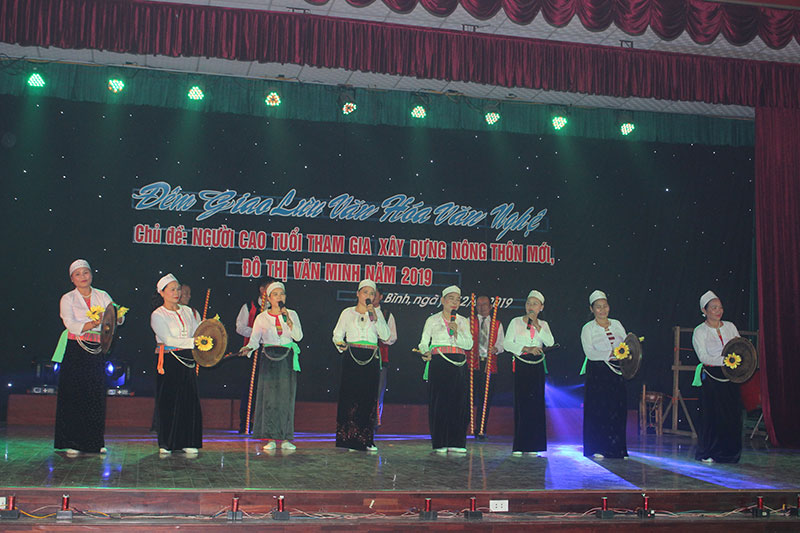
(HBO) - In the evening of September 12, at the Cultural House of Hoa Binh City, the Provincial Elderly Association organized a night of cultural and arts exchanges with the theme "The participation of the elderly people in building new rural and civilized urban areas” in 2019. There were leaders from different departments and appropriate authorities of the province, the leaders from the People's Committees of the districts, the city and other levels of the Elderly Association in the province taking part in.
 People" of the Elderly Association from Yen Thuy district is in the exchange night.
People" of the Elderly Association from Yen Thuy district is in the exchange night.
In the night of exchange, representing more than 103,000 members of the Elderly Association in the province, the amateur actors who are members of the elderly clubs and cultural and arts teams from 11 districts and the city have brought the audience 22 special cultural and artistic performances, which are imbued with the cultural identity of the ethnic groups and full of humanity meanings. The songs, dances, music, and skits not only follow the theme of "The participation of the elderly people in building new rural and civilized urban areas” but they also leave a deep impression from the elderly with the dances and the songs praising the Party, Uncle Ho, the love for the homeland, the country, the contributions of all people in the cause of the national construction and the role of the elderly in the fields of social life.
The night of the cultural exchange is also a practical activity towards celebrating the International Day of the Elderly on October 1. At the same time, it has also contributed to arouse and consolidate the national pride for the officials and the elderly members with the young generation about the revolutionary tradition, the moral of drinking water, remembering the source of our nation. It has created the momentum for the strong and practical movement of the participation of the elderly people in building new rural and civilized urban areas.
With an increasingly vibrant and widespread emulation movement aimed at building cultured residential areas and cultured families, Yen Thuy District has been making steady progress toward improving both the material and spiritual well-being of its people, while fostering a civilized, prosperous, beautiful, and progressive community.
Once lacking recreational spaces and community facilities, Residential Group 2 in Quynh Lam Ward (Hoa Binh City) has recently received attention for the construction of a new, spacious, and fully equipped cultural house. The project followed the model of state support combined with public contributions in both labor and funding.
The "All people unite to build cultural life" movement, which has been effectively integrated with Kim Boi district’s socio-economic development goals, is fostering a lively spirit of emulation across local residential areas, hamlets, villages, public agencies, and enterprises. In addition, through the initiative, traditional cultural values are being preserved and promoted, while community solidarity and mutual support in poverty reduction and economic development are being strengthened.
A working delegation of the Hoa Binh provincial People’s Committee led by its Permanent Vice Chairman Nguyen Van Toan on June 11 inspected the progress of a project to build the Mo Muong Cultural Heritage Conservation Space linked to tourism services in Hop Phong commune, Cao Phong district.
Born and growing in the heroic land of Muong Dong, Dinh Thi Kieu Dung, a resident in Bo town of Kim Boi district, in her childhood was nurtured by the sweet lullabies of her grandmother and mother. These melodies deeply imprinted on her soul, becoming an inseparable part of her love for her ethnic group's culture. For over 20 years, this love for her hometown has driven Dung to research, collect, and pass down the cultural values of the Muong people to future generations.
In the final days of May, the Ethnic Art Troupe of Hoa Binh Province organized performances to serve the people in remote, mountainous, and particularly disadvantaged areas within the province. These were not just ordinary artistic shows, but they were the meaningful journeys aimed at spreading cultural values, enhancing the spiritual life of the people and contributing to the preservation of ethnic minority cultural identities.



 People" of the Elderly Association from Yen Thuy district is in the exchange night.
People" of the Elderly Association from Yen Thuy district is in the exchange night.